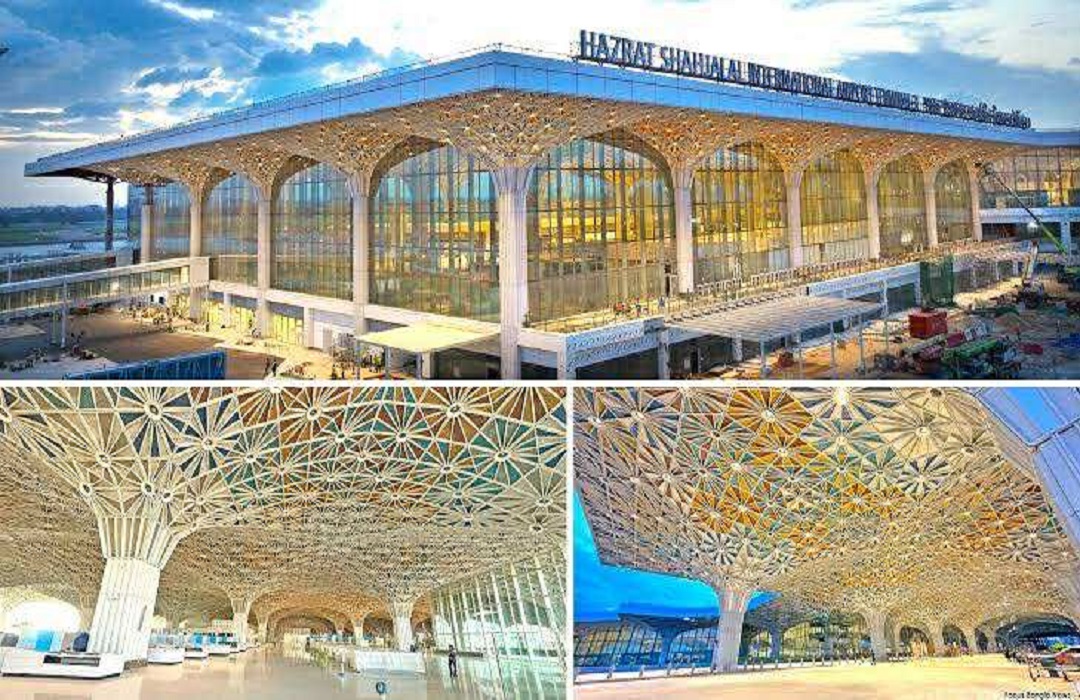Inside Dhaka’s terminal 3: Bangladesh’s leap toward modern aviation hub
প্রকাশ: বৃহস্পতিবার । নভেম্বর ০৬, ২০২৫

Dhaka’s Hazrat Shahjalal International Airport is on the
verge of a major transformation with the completion of its Terminal 3, an
ultra-modern complex expected to reshape Bangladesh’s air travel experience.
Once in full operation, the terminal will have the capacity to serve nearly 12
million passengers annually, almost double the combined capacity of the
existing terminals.
Developed under the Hazrat Shahjalal International Airport
Expansion Project, Terminal 3 stands as one of the most ambitious aviation
infrastructure projects in South Asia.
Terminal 3’s architecture blends functionality with modern
design. The main terminal building covers around 2 lakh 30 thousand square meters,
complemented by an apron area of 5 lakh 42 thousand square meters capable of accommodating
37 aircraft simultaneously.
The terminal layout has been optimized for seamless
passenger movement, featuring 10 self-check-in kiosks, an automated baggage
handling system, and 10 e-gates for e-passport holders. Additionally, 56 manual
immigration counters will ensure smoother processing during peak hours.
Each section, from check-in to boarding, has been designed to
minimize congestion and reduce the overall processing time per passenger.
According to officials, automation will play a key role in maintaining
efficiency and ensuring better security compliance.
Beyond capacity, Terminal 3 is designed with passenger
well-being in mind. There are 16 baggage belts for regular luggage and four
additional belts for oversized or special baggage. A dedicated Lost & Found
unit and three storage zones will help travelers recover misplaced items with
ease.
Families will benefit from facilities such as baby-care
rooms, breastfeeding booths, diaper-changing areas, and a children’s play zone, features rarely found in airports across South Asia.
Healthcare support will be available 24/7 with on-site
doctors, first-aid rooms, isolation areas, and diagnostic facilities, including
COVID-19 testing stations and disease surveillance units.
The terminal’s interior will also include movie lounges,
airline waiting lounges, and day rooms for transit passengers. For leisure and
shopping, travelers can explore 14 duty-free outlets, a large food court, and a
gourmet food gallery, all equipped with Wi-Fi access and multiple charging
stations.
Cultural and social needs have been taken into account as
well, with separate prayer rooms for men and women, and a spacious 'Meet &
Greet Plaza' for visitors and families.
One of the most transformative aspects of Terminal 3 is its
integration with the Dhaka Metro Rail system. A dedicated station under Metro
Line-1 is being built adjacent to the terminal, offering direct, high-speed
connectivity between the airport and major city zones. This link is expected to
reduce travel time for passengers significantly and help decongest airport
traffic.
In addition to passenger facilities, the project includes a
modern Cargo Village covering 63,000 square meters. The new complex will boost
the airport’s freight handling capacity from 2.58 million tons to 4 million
tons per year, positioning Bangladesh as a stronger player in regional trade
logistics.
The overall construction is being carried out by Samsung
C&T Corporation of South Korea, under financial assistance from the Japan
International Cooperation Agency (JICA). The project received formal approval
in October 2017 and is nearing full operational readiness.
Once inaugurated, Terminal 3 is expected to bring a paradigm
shift to Bangladesh’s aviation landscape. With expanded capacity, smart
technology, and improved amenities, it will not only enhance the passenger
journey but also contribute to Bangladesh’s long-term goals of boosting tourism
and export-driven growth.
Aviation experts view the project as a strategic investment
that could help Dhaka evolve into a regional air hub for South and Southeast
Asia. However, operational efficiency, maintenance, and service quality will
determine how effectively the terminal delivers on its promise.
In many ways, Terminal 3 represents more than just an
airport expansion, it’s a statement of Bangladesh’s readiness to move toward a
smarter, more connected future in global aviation.
